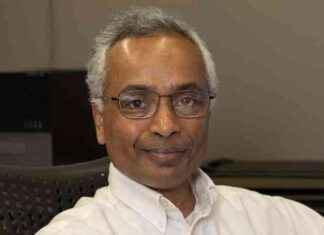In view of the ongoing shelling of the Zaporizhia nuclear power plant, which is occupied by Russian troops, international experts fear for safety there after a visit. The head of the International Atomic Energy Agency (IAEA) Rafael Grossi said in Vienna that his greatest concern remains that the nuclear power plant could be severely damaged by further shelling. Although damage is obvious and unacceptable, important safety elements such as the power plant’s power supply are working.
The cooperation between the Russian occupiers and the Ukrainian staff is also working to some extent on a professional level, Grossi said on Friday evening after his return from Ukraine at Vienna Airport. He expects a detailed analysis of the safety of the power plant by the experts who remain on site in the course of the next week. Six IAEA experts are still at the nuclear power plant. Four would return, with two staying on site until further notice.
He doesn’t have the impression that the Russian occupiers have hidden anything. “We saw everything I wanted to see,” said Grossi. A crucial difference to before is also that he now learns from his own sources what is happening on site.
The IAEA chief emphasized again that he sees his agency’s mission as permanent. “The IAEA is there to stay as long as necessary.” The Ukraine and Russia currently agree to this. He knows things could change. What worries him most at the moment is that the war around the power plant is increasing in intensity, Grossi said.
The IAEA experts have been in the power station town of Enerhodar since Thursday. The Zaporizhia NPP came under Moscow control in early March, shortly after the Russian invasion. Repeated shelling of the power plant site and the neighboring town have raised international fears of a possible nuclear catastrophe. Russia and Ukraine repeatedly accuse each other of artillery shelling. With its six blocks and a net output of 5700 megawatts, the nuclear power plant is the largest nuclear power plant in Europe. Before the start of the war, more than 10,000 people worked there.
According to Ukraine, it fired on Russian artillery positions not far from the Zaporizhia nuclear power plant. “It has been confirmed that our troops in the area of ??the towns of Cherson and Enerhodar destroyed three enemy artillery systems with precise hits,” the Ukrainian general staff said on Facebook on Friday evening. An ammunition depot and at least one company of the Russian army were also said to have been destroyed.
The Russian occupiers removed all military technology from the nuclear power plant site and relocated it to neighboring locations before the IAEA group of experts arrived. The information could not be independently verified. Russia had always maintained that it had no heavy weapons stationed at the power plant site.
Ukrainian President Volodymyr Zelenskyy has repeatedly accused Russia of nuclear terrorism in view of the situation around the nuclear power plant. Russia, on the other hand, rejects calls for the power plant to be returned to Ukraine’s control because Moscow believes that Kyiv cannot guarantee the safety of the plants in a war.
Meanwhile, Zelenskyy hailed the West’s planned new energy sanctions against Russian oil as a show of support for his country. “The time for the sanctions is long overdue,” said the head of state in a video distributed on Friday evening. “The sanctions will not only limit the flow of petrodollars and gas euros to Moscow, but also restore justice to all Europeans who are being blackmailed by Russia with an artificially created price crisis in the energy market.”
As economically strong democracies, the group of seven leading industrial nations G7, including Germany and France, want to ensure that Russia earns less from its oil. This is intended to dry up a source of funding for the war against Ukraine. The goal is an international price cap on imports of Russian oil. In a joint statement on Friday, G7 finance ministers urged all oil-importing countries to join the move. Despite a US embargo on its oil, Russia continues to make a lot of money from the “black gold” that is sold to India, for example.
The price cap will help protect civilian states and energy markets from Russian aggression in the energy sector, Zelenskyy said. He is grateful to EU Commission President Ursula von der Leyen for this suggestion. Ukraine needs Europe’s support. Assistance to Ukraine is equivalent to protecting “the whole democratic world,” Zelensky said.
Meanwhile, Kyiv wants to help Germany with the delivery of nuclear power on its way out of dependence on Russian energy. “Ukraine is currently exporting its electricity to Moldova, Romania, Slovakia and Poland. But we are quite ready to expand our exports to Germany,” Ukrainian Prime Minister Denys Schmyhal told the German Press Agency.
Parallel to the Russian invasion at the end of February, the Ukraine and the neighboring country of Moldova had disconnected from the former Soviet power grid. Synchronization with the European network took place in mid-March. Since then, the country has been exporting between 400 and 700 megawatts of electricity to the EU and Moldova every day. Schmyhal now wants to increase the export quotas for the EU many times over. Soviet-designed nuclear power plants with a total capacity of more than 14 gigawatts are operated in Ukraine, including Zaporizhia.
Schmyhal is expected in Berlin on Saturday and will be received by Chancellor Olaf Scholz (SPD) in the Chancellery on Sunday.
Contrary to plan, Gazprom will not resume gas deliveries through Germany’s most important supply pipeline, Nord Stream 1, on Saturday after maintenance work. The reason was an oil leak in the Portovaya compressor station, the Russian state-owned company surprisingly announced on Friday evening. The federal government and the Federal Network Agency reacted calmly: the situation on the gas market was tense, but security of supply was guaranteed.










